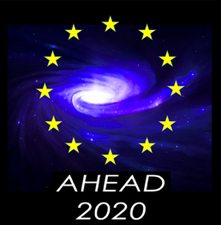AHEAD2020 - Integrated Activities for the High Energy Astrophysics Domain
 AHEAD2020 builds on our previous program, funded in H2020 as starting community, that allowed us to qualify now as advanced community. Our overall objective remains to advance further the integration of national efforts in high-energy astrophysics keeping the community at the cutting edge of science and technology and ensuring that observatories are at the state of the art. At the same time, AHEAD2020 aims at widening its horizons to further integrate activities with the newly born multimessenger astronomy, boosted very recently by the discovery of gravitational waves and cosmic neutrinos and of their first high energy counterparts. This will be achieved by a new large community of high energy astronomers, gravitational wave and astroparticle scientists. Along the road paved until recently, we will keep strengthening the theorethical efforts, also building up on the results of the observations of multimessenger sources; and continue opening the best infrastructures for data analysis of high-energy space and ground observatories. Furthermore we will integrate key infrastructures for on-ground test and calibration of spacebased instrumentation and promote their coordinated use. Technological developments will focus on the improvement of selected detector, optics devices and advanced analysis tools for the benefit of future space missions and groundbased multimessenger facilities, with more emphasis on the observation of the new transient Universe.
AHEAD2020 builds on our previous program, funded in H2020 as starting community, that allowed us to qualify now as advanced community. Our overall objective remains to advance further the integration of national efforts in high-energy astrophysics keeping the community at the cutting edge of science and technology and ensuring that observatories are at the state of the art. At the same time, AHEAD2020 aims at widening its horizons to further integrate activities with the newly born multimessenger astronomy, boosted very recently by the discovery of gravitational waves and cosmic neutrinos and of their first high energy counterparts. This will be achieved by a new large community of high energy astronomers, gravitational wave and astroparticle scientists. Along the road paved until recently, we will keep strengthening the theorethical efforts, also building up on the results of the observations of multimessenger sources; and continue opening the best infrastructures for data analysis of high-energy space and ground observatories. Furthermore we will integrate key infrastructures for on-ground test and calibration of spacebased instrumentation and promote their coordinated use. Technological developments will focus on the improvement of selected detector, optics devices and advanced analysis tools for the benefit of future space missions and groundbased multimessenger facilities, with more emphasis on the observation of the new transient Universe.
AHEAD2020 will support the community via grants for collaborative studies, dissemination of results, and promotion of workshops and a strong public outreach package will ensure that the domain is well publicised at both national and international level. AHEAD will also contribute to the benefit of society and to the growth of the European technology market, with specific studies of devices for cultural heritage, material composition and environmental monitoring, as well as the creation of a new generation of researcher.
![]() This project has received funding from the European Union’s Horizon 2020 research and innovation programme under grant agreement No 871158
This project has received funding from the European Union’s Horizon 2020 research and innovation programme under grant agreement No 871158
Project details
Scientific responsability: Piero Rosati
Funding source: HORIZON 2020
Start date : 02/03/2020 End date: 01/12/2024
Total cost: 9.963.302 €
EU contribution: 9.963.302 €
EU contribution to UniFe: 121.517,46 €
Participants
- Istituto Nazionale Di Astrofisica, Italy
- Stichting Nederlandse Wetenschappelijk Onderzoek Instituten, Netherlands
- Max-Planck-Gesellschaft zur Forderung der Wissenschaften Ev; Germany
- National Observatory uf Athens, Greece
- University of Leicester, United Kingdom
- Universidad de Alicante, Spain
- European Gravitational Observatory (Ego), Italy
- Istituto Nazionale di Fisica Nucleare, Italy
- Centre National de la Recherche Scientifique CNRS, France
- Gran Sasso Science Institute, Italy
- Universite de Geneve, Switzerland
- Agencia Estatal Consejo Superior Deinvestigaciones Cientificas, Spain
- Commissariat a l Energie Atomique et aux Energies Alternatives, France
- Consiglio Nazionale Delle Ricerche, Italy
- Thales Alenia Space Italia SPA, Italy
- University College Dublin, National University Of Ireland, Dublin; Ireland
- Universite de Liege, Belgium
- Universita degli Studi di Palermo, Italy
- Ceske Vysoke Uceni Technicke V Praze, Czech Republic
- Centrum Astronomiczne Im. Mikolajakopernika Polskiej Akademii Nauk, Poland
- Universiteit Leiden, Netherlands
- Physikalisch-Technische Bundesanstalt, Germany
- Università degli Studi di Genova, Italy
- Eberhard Karls Universitaet Tuebingen, Germany
- Ludwig-Maximilians-Universitaet Muenchen, Germany
- Associacao do Instituto Superior Tecnico para a Investigacao e Desenvolvimento, Portugal
- Universiteit Van Amsterdam, Netherlands
- Swhard Srl, Italy
- Johannes Gutenberg-Universitat Mainz, Germany
- Tartu Ulikool, Estonia
- Laboratorio de Instrumentacao e Fisica Experimental de Particulas, Portugal
- Danmarks Tekniske Universitet, Denmark
- Eotvos Lorand Tudomanyegyetem, Hungary
- University of Bath, United Kingdom
- Stiftung Deutsches Elektronen-Synchrotron Desy, Germany
- Kaon Gmbh, Germany
- Cosine Research Bv, Netherlands
- Università degli Studi di Trieste. Italy
